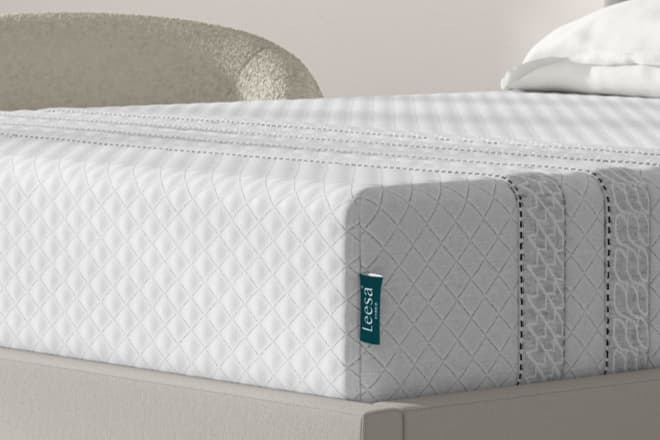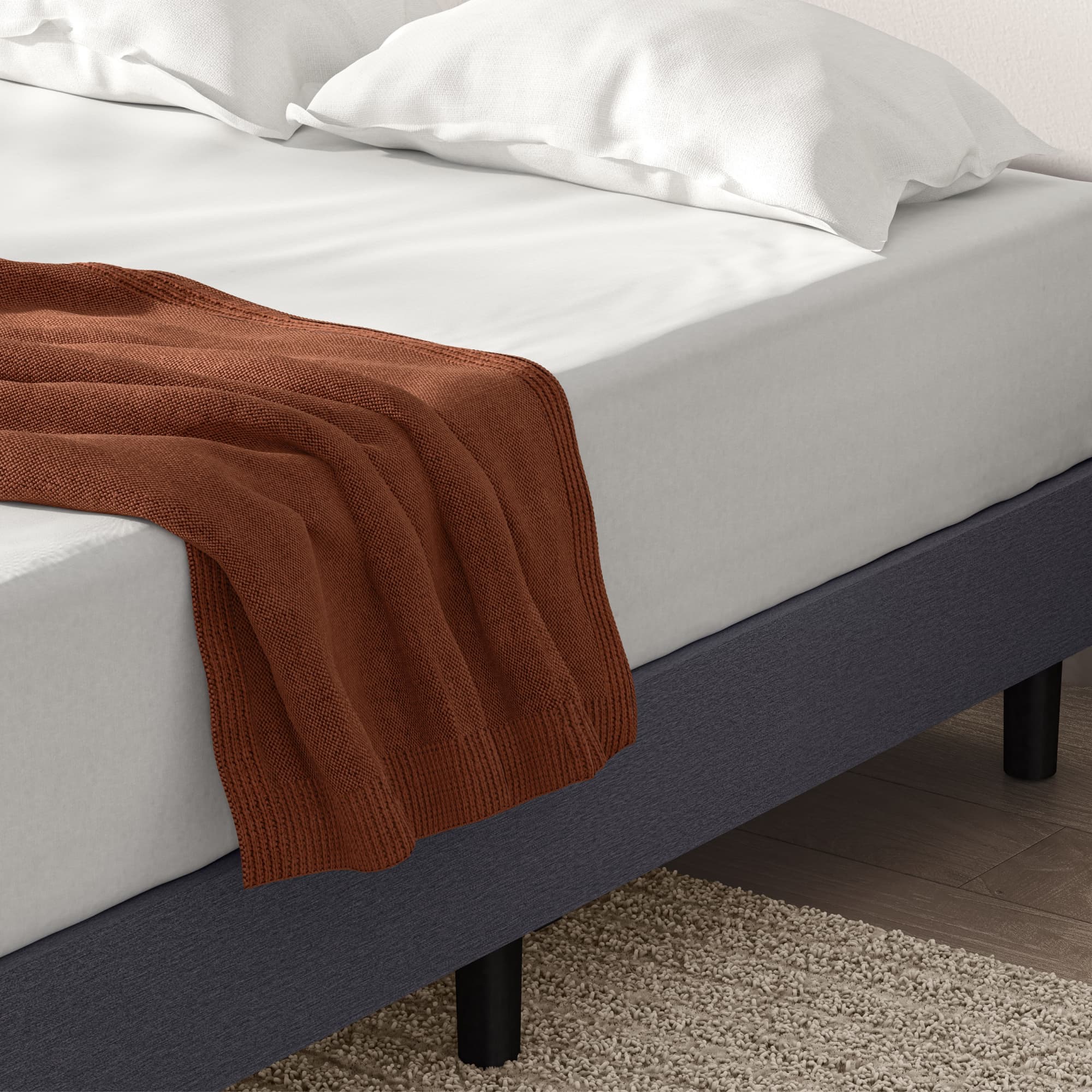Do you keep finding yourself tossing and turning on a sagging mattress? Waking up with aches and pains and other discomforts? You might be starting to wonder, “How long do mattresses last?” and maybe, “How long have I actually had this mattress?”
We probably can’t help you with that second question, but we’re here to answer the first one. So let’s take a deep dive into the average life of a mattress and show you how to maximize your mattress’s lifespan.
Mattress Types
When it comes to mattresses, there are all kinds of options out there. Each one has its own unique features, materials, and construction, which can all affect the life of a mattress. So, if you're wondering, “How long do foam mattresses last?” or “Should I still be using the mattress I’ve had since high school?”, you've come to the right place! We've got all the information you need right here. Let's jump in and explore the lifespans of various mattress types.
How long do memory foam mattresses last?
Memory foam was originally developed by NASA in 1970 and used as cushioning to keep test pilots safer, but the viscoelastic product is now used for a variety of products, including mattresses.
Memory foam mattresses typically consist of layers of several different types of foam, some denser for more support and others softer for breathability and cloud-like comfort. Depending on the quality of the materials, you can expect a memory foam mattress to last around 7-10 years. To get the maximum lifespan, look for a mattress made of 100% memory foam, like Leesa's Original and Studio mattresses.

How long does a latex mattress last?
True latex is derived from the sap of rubber trees, so it’s a popular option for people looking for an all-natural or organic mattress. But genuine latex mattresses are also expensive, and cheaper offerings are usually made with synthetic styrene butadiene rubber.
A natural latex mattress will last anywhere from 10-20 years, but synthetic latex mattresses only hold up for around 6-10 years.
How long does an innerspring mattress last?
Innerspring mattresses were the default option for decades before hybrid and memory foam mattresses came on the scene. (And they’re also the best option for jumping on the bed—which, honestly, is still fun for us grown-ups.) They’re made up of metal coils surrounded by cotton batting and sometimes include a pillow-top layer.
While innerspring mattresses are typically quite affordable, they also have the shortest lifespans at just 5-7 years.
How long does a hybrid mattress last?
Hybrid mattresses like the Leesa Sapira Hybrid and Legend Hybrid offer the best of both worlds. The pressure relief and comfort of a memory foam mattress and the support of an innerspring mattress. They come in a wide range of firmness levels, and some offer perks like cooling gel layers and plush pillow-tops.
It depends on the quality and design of the mattress. But you can generally expect to get 7-10 years of use out of your hybrid mattress.
Factors Influencing Mattress Lifespan
You can’t make a mattress last forever. But you can get maximum use out of it by choosing a high-quality option and taking care of it properly. These factors all impact how long your mattress will provide you with comfortable relaxation and enhanced sleep quality.
Materials
As you can see from the list above, materials play a critical role in a mattress’s lifespan. Latex tends to be the longest-lasting mattress material, but it’s also the most expensive, and many people are allergic to latex . Innerspring mattresses have low price tags, but you sacrifice quality and longevity. Memory foam mattresses and hybrid mattresses are excellent middle-of-the-road options that offer high-quality and long lifespans at cost-effective price points.
Quality
A mattress is one of those things where you get what you pay for. So if you want a hybrid or memory foam mattress that lasts for 10 years or a latex mattress that lasts for 20? You’ll have to pay more for one made with high-quality materials. If you’re still on the fence? You should also know that those cheaper options are often made with harmful synthetic materials. These can negatively affect both your health and the environment.
All of Leesa's memory foam and hybrid mattresses are CertiPUR-US® Certified. That means the foam we use is made without toxic chemical flame retardants, formaldehyde, or phthalates. It’s free from heavy metals, and it supports indoor air quality since it emits few volatile organic compounds ( VOCs ).
Body Weight
Body weight can indeed have an impact on the lifespan of a mattress. The amount of weight exerted on a mattress can cause it to wear down more quickly over time. Heavier individuals may experience more compression and stress on the mattress, leading to a shorter lifespan.
On the other hand, lighter individuals may not exert as much pressure on the mattress. This allows it to maintain its shape and support for a longer period of time. And we’re not singling out individuals here, either. If you have two or more people (and maybe even pets) sharing a mattress, that mattress probably won’t last as long as one you only use yourself.
Usage
The way you use your mattress can significantly influence its lifespan. If you spend a lot of time in bed, whether lounging, working, or binge-watching your favorite shows? Your mattress will naturally experience more wear and tear. Constantly putting pressure on the same areas can lead to uneven wear, sagging, and reduced support over time. On the other hand, if you primarily use your mattress for sleeping and practice proper mattress care? Like regularly rotating and cleaning it, you can extend its lifespan.
How can I make my mattress last longer?
Taking good care of your mattress is the key to making it last longer. Keep it clean by giving it a regular vacuum to get rid of dust and allergens. If you spill something, don't wait — tackle the stain ASAP with a mild cleaner. And hey, don't forget to let your mattress breathe! Strip off the bedding and let some fresh air in from time to time.
Now, here's a secret weapon: a mattress protector. It's like a superhero cape for your mattress, guarding it against spills, stains, allergens, and even bed bugs. Trust us. It's a game-changer.
And remember to give your mattress a regular spin every few months! Rotating your mattress every few months keeps it in tip-top shape. It evens out the wear and tear, so there is no more sagging in one spot.
Last but not least, get your mattress a solid bed frame that (literally) has its back. A supportive bed frame is the backbone of your mattress's longevity. Pick one that matches the size and weight of your mattress and gives it the stability it deserves.
So remember: clean it, protect it, rotate it, and give it a sturdy frame. With these tricks up your sleeve, your mattress will be your sleep companion for years of cozy nights.
When To Replace a Mattress
If you start to notice fraying, excessive sagging or wear and tear, or any other signs of deterioration? That’s a clear indication that your mattress is past its prime. But sometimes the signs are less obvious. For example, is your mattress making strange noises every time you move? Do you find yourself waking up with discomfort or body aches? Allergies acting up due to accumulated dust mites and allergens? These are all signs that it might be time to say goodbye to your old bed and welcome a new one into your life.
So if you’re in the market for a new mattress, just remember that quality and materials matter. An investment in a high-quality mattress is an investment in your health and well-being. And once you’re sleeping soundly on your new bed? Make sure you give your mattress the care and protection it needs to keep supporting you for years to come.
FAQS
Can a mattress last 20 years?
Your mattress won’t disintegrate or spontaneously combust at the end of its lifespan. But it's highly unlikely a 20-year-old mattress will be comfortable or healthy to sleep on. The average life of a mattress is around 7-10 years for memory foam and hybrid models. 10-20 years for latex options, and only 5-7 years for traditional innerspring mattresses.
What should I do with an old mattress?
If it's still in decent shape and can provide a good night's sleep for someone else? Consider donating your unneeded mattress to a local nonprofit organization. It's a great way to give back and help someone in need. But if your mattress has seen better days and recycling is on your mind, explore the available options in your area. Many communities offer mattress recycling programs that can responsibly dispose of or repurpose the materials. In fact, around 90% of materials in an innerspring mattress can be recycled, benefiting both you and the environment.
What causes a mattress to sink in the middle?
It's all due to wear and tear over time. As you cozy up night after night, the materials in your mattress, like foam and coils, gradually start to soften and lose their original support. But don’t worry. There are a couple of things you can do to prevent or minimize sagging. First, make sure to rotate your mattress regularly (no need for flipping) to distribute the weight evenly.
And don't forget to provide it with the proper foundation or support system to maintain its shape and longevity. By taking these simple steps, you can keep your mattress in better condition and bid farewell to that pesky sink in the middle.



